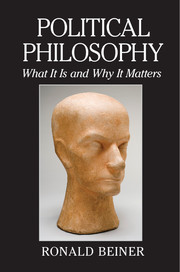Book contents
- Frontmatter
- Dedication
- Contents
- First Prologue: Horizons of Political Reflection
- Second Prologue: Freud, Weber, and Political Philosophy
- 1 Hannah Arendt: The Performativity of Politics
- 2 Michael Oakeshott: Life’s Adventure
- 3 Leo Strauss: The Politics of Philosophy
- 4 Karl Löwith: In Awe of the Cosmos
- 5 Excursus on Nature and History in the Strauss-Löwith Correspondence
- 6 Eric Voegelin: Modernity’s Vortex
- 7 Simone Weil: The Politics of the Soul
- 8 Hans-Georg Gadamer: Philosophy without Hubris
- 9 Jürgen Habermas: Politics as Rational Discourse
- 10 Michel Foucault’s Carceral Society
- 11 Alasdair MacIntyre: Fragmentation and Wholeness
- 12 Short Excursus on the Rise and Decline of Communitarianism as a Political Philosophy
- 13 John Rawls and the Death of Political Philosophy
- 14 Richard Rorty: Knocking Philosophy off Its Pedestal, or the Death of Political Philosophy Postmodernized
- Epilogue: On Not Throwing in the Towel
- Index
- References
First Prologue: Horizons of Political Reflection
Published online by Cambridge University Press: 05 August 2014
- Frontmatter
- Dedication
- Contents
- First Prologue: Horizons of Political Reflection
- Second Prologue: Freud, Weber, and Political Philosophy
- 1 Hannah Arendt: The Performativity of Politics
- 2 Michael Oakeshott: Life’s Adventure
- 3 Leo Strauss: The Politics of Philosophy
- 4 Karl Löwith: In Awe of the Cosmos
- 5 Excursus on Nature and History in the Strauss-Löwith Correspondence
- 6 Eric Voegelin: Modernity’s Vortex
- 7 Simone Weil: The Politics of the Soul
- 8 Hans-Georg Gadamer: Philosophy without Hubris
- 9 Jürgen Habermas: Politics as Rational Discourse
- 10 Michel Foucault’s Carceral Society
- 11 Alasdair MacIntyre: Fragmentation and Wholeness
- 12 Short Excursus on the Rise and Decline of Communitarianism as a Political Philosophy
- 13 John Rawls and the Death of Political Philosophy
- 14 Richard Rorty: Knocking Philosophy off Its Pedestal, or the Death of Political Philosophy Postmodernized
- Epilogue: On Not Throwing in the Towel
- Index
- References
Summary
We learn moral and political philosophy, and indeed any other part of philosophy, by studying the exemplars.
John RawlsIf John Rawls is right that “studying the exemplars” is essential to initiating ourselves into philosophy, including political philosophy, then we cannot avoid judgments about who the exemplars are. This book proposes twelve such exemplars; it tries to reflect on the state of political philosophy by testing the force of their respective philosophic visions and by pursuing a dialogue intended to encompass the author, the reader, and all twelve of these thinkers. Machiavelli, in a famous letter, spoke of putting on “regal and courtly garments” and entering “the ancient courts of ancient men” in order to converse with privileged interlocutors. Can we summon up a similar spirit in conversing with leading thinkers of the twentieth century?
As we discuss later, there is nothing neutral – nor could there be – about our selection of “classics.” One could no doubt have a whole series of arguments about whether to add X or subtract Y, but all such (hypothetical) squabbles are more or less beside the point. For the time being, the reader will simply have to trust my judgment, pending my attempts in the following chapters to show why the twelve I have chosen are an interesting assemblage of thinkers, generating a worthwhile set of intramural debates and reciprocal challenges. Beyond the particular set of thinkers I have privileged, what matters is the idea of political philosophy as a dialogical enterprise conducted in relation to superlatively ambitious articulations of “the human good.” Hence, even if other students of political philosophy would choose other exemplars, reconstructing a sustained dialogue among this particular group should serve to illustrate the intellectual potential of political philosophy conceived as such a dialogue, and help us begin the process of weighing to what extent political philosophy as it has been practiced over the last fifty or sixty years has fulfilled its aspirations or fallen short of them.
- Type
- Chapter
- Information
- Political PhilosophyWhat It Is and Why It Matters, pp. ix - xxviiiPublisher: Cambridge University PressPrint publication year: 2014



